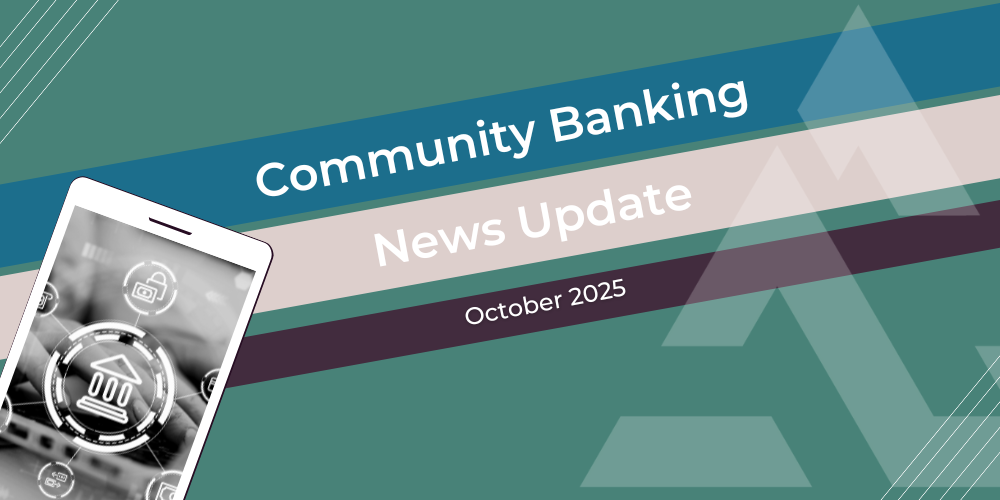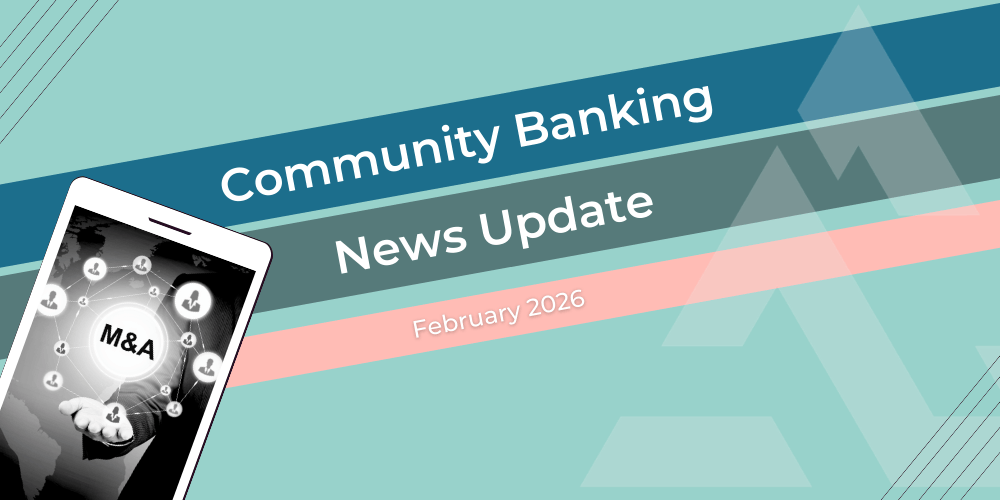The Exchange Newsletter - February 2026
This month's must-knows on bank charter momentum, ISO 20022 friction, and modern correspondent banking strategy As we move into 2026, it feels like...
7 min read
 Daisy Lin, Head of Marketing, Acceleron
:
10/8/25 2:28 PM
Daisy Lin, Head of Marketing, Acceleron
:
10/8/25 2:28 PM

This month’s banking news carries direct implications for community banks and credit unions: The OCC dramatically reduces regulatory burden for community banks; Meanwhile, the federal government shutdown threatens to pause SBA lending, stall some mortgage closings, and delay key economic data releases. Fiserv announced acquisitions to expand federally insured deposit offerings and strengthen advisory services for community FIs. JPMorgan will begin charging Plaid for customer data access, Coinbase is pursuing a bank charter, and some big bank M&As are in the works. Here are the details and why they matter for community financial institutions.
The Office of the Comptroller of the Currency (OCC) announced sweeping changes to how it supervises community banks, eliminating nearly all non-statutory examination requirements and shifting to a fully risk-based approach starting January 1, 2026. Under the new framework, examiners will have broad discretion to determine exam scope and frequency based on each bank’s size, complexity, and risk profile, rather than following rigid, policy-based checklists. The OCC said the move will streamline oversight and “relieve community banks of unproductive reporting requirements” so they can focus more on local lending.
Community banks, defined by the OCC as those with $30 billion or less in assets, will also see reduced compliance burden in specific areas. The agency will no longer use the complex Retail Nondeposit Investment Products (RNDIP) handbook for investment-product reviews, deeming it excessive for smaller institutions. In a related bulletin, the OCC said it will allow banks to set their own schedules for model validations rather than mandating annual reviews, and it will not penalize banks that take a “lighter-touch” approach when appropriate.
This is a significant regulatory shift for community institutions. The OCC’s plan could substantially reduce examination workload and compliance costs, while giving banks more flexibility in managing risk. However, the new discretion-based model also increases variability: exam outcomes may hinge more on examiner judgment than standardized procedures. For community banks and credit unions, it’s an opportunity to redirect resources, but it also places greater responsibility on internal risk management and documentation to demonstrate soundness under the new lighter-touch framework.
Read our Chief AML Officer Sarah Beth Felix's comments on these updates, and her article outlining the 5 pillars of an effective AML program:
2. Government shutdown: SBA lending likely paused, key data go dark
With the federal government still shut down, most bank regulators (Fed, FDIC, CFPB) remain open because they’re self-funded, but several adjacent programs are already constrained or expected to be, creating tangible knock-on effects for lenders. The National Flood Insurance Program has closed to new policies, which can stall mortgage closings that require federal flood coverage; the SEC has historically gone dark during shutdowns, slowing capital markets activity. Meanwhile, SBA lending is expected to see processing delays. Observers say SBA loans likely won’t be processed, and Community Development Financial Institution (CDFI) programs face disruptions to certifications, applications, and even basic website updates and help-desk support. On top of that, the Bureau of Labor Statistics and other statistical agencies largely stopped publishing reports, creating a short-term blackout of employment and other economic indicators that banks use for planning.
For community lenders active in SBA programs, pending applications may stall until Congress restores funding, forcing tough conversations with borrowers in need of working capital. CDFIs could see their pipelines slowed by administrative delays, affecting access to credit in underserved communities. The pause in federal economic data adds another layer of uncertainty, complicating interest-rate risk management and strategic planning. Community banks and credit unions may need to prepare contingency plans, such as alternative financing options or adjusted credit policies, while communicating proactively with small business and nonprofit clients caught in the shutdown’s ripple effects.
3. Fiserv Expands Capabilities with StoneCastle and Smith Consulting Group Acquisitions
Fiserv announced two acquisitions aimed at strengthening its offerings for financial institutions. First, the company agreed to acquire StoneCastle, a deposit network that enables banks and credit unions to provide customers with up to $100 million in federally insured deposits. The deal, expected to close in early 2026, will allow Fiserv to integrate insured deposit products directly into its core processing, digital banking, payments, and cash management platforms. StoneCastle already serves more than 300 Fiserv banks and channels deposits from corporations, universities, and other institutions.
Separately, Fiserv acquired Smith Consulting Group, a management consulting firm specializing in advisory services for community financial institutions. This acquisition expands Fiserv’s consulting arm, giving banks and credit unions access to strategy, operations, and technology advisory services tailored to the challenges of modern banking.
Both deals reflect how Fiserv is broadening its toolkit for smaller institutions. StoneCastle integration could help community banks and credit unions better serve large depositors while navigating evolving regulatory scrutiny around reciprocal and brokered deposits. The Smith Consulting acquisition means Fiserv can offer advisory expertise alongside its technology stack. Together, these moves reinforce Fiserv’s role as a one-stop partner.
Acceleron’s executive team just returned from the Fiserv Forum Client Conference. Read about our pre-integration with Fiserv Payments Exchange:
Coinbase has formally applied for a national trust charter with the Office of the Comptroller of the Currency, which would allow the crypto exchange to broaden its offerings beyond custody into payments and other financial services under federal oversight. The company emphasized it has “no intention of becoming a bank” but wants clear, uniform rules for digital assets. Other crypto firms, including Circle, Ripple, and Paxos, have submitted similar applications, while Anchorage Digital remains the only firm with an OCC-approved trust bank charter.
If approved, Coinbase’s charter could accelerate the integration of digital assets into traditional finance, setting a precedent for how fintechs operate under federal supervision. Community institutions could face both competitive pressure and partnership opportunities, especially in areas like payments, custody, and digital asset management. The move also underscores the OCC’s growing role in defining the regulatory perimeter between banks and crypto firms, an area that could influence how future fintech collaborations are structured.
Read our article about stablecoin impacts on bank deposits:
JPMorgan Chase and Plaid announced a deal in which the megabank will begin charging the data aggregator for access to its customer information, marking a significant shift in the economics of open banking. While the fees are reportedly fractions of a cent per data pull, JPMorgan said the move reflects the heavy costs of maintaining secure infrastructure amid billions of monthly requests. Plaid emphasized that its fintech and bank clients will not bear the new costs, assuring continuity of service.
The deal sets a precedent for banks charging fintechs to access customer data, even as the CFPB rewrites its data-sharing Rule 1033. If fees for data access become standard, smaller banks and credit unions could face higher costs when partnering with aggregators to deliver digital services. But there’s also upside: it underscores that consumer data is a valuable asset, and even community institutions could benefit from treating it strategically. By tightening control over how their data is shared, and potentially negotiating value for that access, community banks and credit unions may be able to strengthen their role in fintech partnerships while ensuring their customers’ information is protected.
Read our interview with the CEO of Fingoal about open banking:
Fifth Third Bank is acquiring regional lender Comerica in a $10.9 billion all-stock deal, making it the ninth-largest lender in the U.S. Meanwhile, PNC announced a $4.1 billion agreement to acquire Colorado-based FirstBank, giving it 95 new branches across Colorado and Arizona. In addition, other regionals unveiled new acquisitions: Indiana’s First Merchants will buy an in-state peer for $241.3 million; Mid Penn Bancorp plans to expand into New Jersey; QNB Corp. in Pennsylvania agreed to acquire a smaller local bank for $41 million; and Prosperity Bank announced a $269 million acquisition of Texas Partners Bank, deepening its footprint in the fast-growing Texas market. Meanwhile, other acquisitions are in process in Minnesota and Arkansas.
The wave of M&A underscores the increasing pace of consolidation across both national and regional tiers. For community institutions, larger competitors are gaining scale, market share, and geographic reach, potentially intensifying competition for deposits and small business customers. At the same time, consolidation often creates openings: customers seeking local relationships may migrate to community banks and credit unions, and merger disruptions can offer opportunities for recruitment and niche service growth.
The Federal Reserve will increase the FedNow Service transaction cap from $1 million to $10 million starting in November. The higher ceiling reflects rising demand for instant payments and enables institutions to handle larger-value transactions such as corporate payroll, real estate closings, and vendor payments. Earlier this year, FedNow introduced new risk mitigation tools, including account activity thresholds, so banks and credit unions can tailor usage to their risk tolerance.
The expanded limit makes FedNow more relevant beyond consumer payments, opening doors for commercial clients who want faster settlement of big-ticket transactions. For community banks and credit unions, this could mean deeper engagement with small and mid-sized businesses seeking real-time payment options, along with the need to adopt stronger fraud controls and risk management practices as transaction sizes grow. Banks and CUs should evaluate their insurance policies for fraud and in particular real-time fraud to ensure their thresholds for coverage align with their limits for FedNow.
The Federal Reserve lowered its benchmark interest rate by a quarter point in September, the first cut of 2025, bringing the target range to about 4.1 percent and signaling a shift toward easing amid slowing economic growth and cooling inflation. The decision, which passed with only one dissenting vote from Governor Stephen Miran (who advocated for a deeper 50-basis-point cut), suggests broad consensus among policymakers for a gradual approach.
In the days following the announcement, banks and credit unions began trimming deposit rates to protect net interest margins, particularly on high-yield savings and certificates of deposit. Analysts say these adjustments reflect the competitive pressure institutions faced during the Fed’s tightening cycle, and their eagerness to lower funding costs now that rates are turning downward.
The rate cut may boost loan demand and relieve some pressure on borrowers, but it also starts a new balancing act for community institutions. Many are moving swiftly to reduce deposit rates to preserve margins, even as customers remain rate-sensitive after two years of aggressive competition for deposits. The Fed’s measured approach means funding costs may ease gradually, but not evenly, making active deposit pricing, liquidity management, and loan repricing strategies key to maintaining profitability as the rate environment shifts.
Last month brought its own set of pivotal developments. We covered the White House’s new executive order on debanking, Circle’s expansion of stablecoin partnerships with Corpay and Finastra, and the OCC’s approval of Anchorage Digital, the first federally chartered crypto bank. We also highlighted how local institutions are testing fractional stock rewards to engage Gen Z customers and piloting AI-powered services for business clients. (Missed it? Catch up here.)

This month's must-knows on bank charter momentum, ISO 20022 friction, and modern correspondent banking strategy As we move into 2026, it feels like...

Key regulatory, policy, and market shifts community banks and credit unions should be watching These are extraordinary times for the banking...

Common international wire failure points and how international payment automation can reduce errors to under 1% In 1871, Western Union introduced...